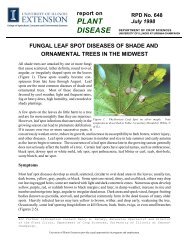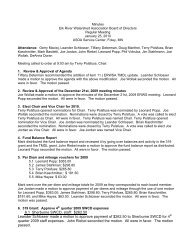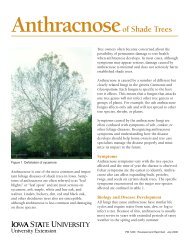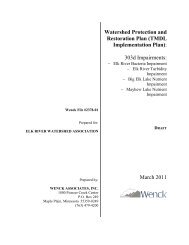3/15/2010 - Sherburne Soil & Water Conservation District
3/15/2010 - Sherburne Soil & Water Conservation District
3/15/2010 - Sherburne Soil & Water Conservation District
You also want an ePaper? Increase the reach of your titles
YUMPU automatically turns print PDFs into web optimized ePapers that Google loves.
Mississippi St. Cloud <strong>Water</strong>shed Project Meeting<br />
Palmer Town Hall<br />
March <strong>15</strong> th , <strong>2010</strong><br />
Meeting Minutes<br />
Attendees:<br />
Mark Basiletti, <strong>Sherburne</strong> SWCD<br />
Tiffany Determan, <strong>Sherburne</strong> SWCD<br />
DeAnna Doran, <strong>Sherburne</strong> SWCD<br />
Gerry Maciej, Benton SWCD<br />
Joe Jacobs, Wright SWCD<br />
Roger Stradal, DNR Sauk Rapids<br />
Sue McGuire, Stearns Environmental Services<br />
Annie Felix, Benton SWCD<br />
Nick Proulx, MN DNR<br />
Chuck Johnson, MPCA<br />
Dennis Fuchs, Stearns SWCD<br />
Rebecca Kluckhohn, Wenck<br />
Joe Stewig, MN DNR, Montrose<br />
Nicki Blake-Bradley, City of Elk River<br />
Lynn Waytashek, <strong>Sherburne</strong> County<br />
Lee Sundmark, MN DNR, Hutchinson<br />
Dennis Loewen, Clearwater River <strong>Water</strong>shed <strong>District</strong><br />
Ronda Adkins, MPCA<br />
Phil Votruba, MPCA<br />
Introductions: Each attendee introduced themselves and stated the organization they represent.<br />
Mississippi St. Cloud Project Update<br />
• Work Plan (Planning & Coordination Phase)<br />
• Contracting<br />
• Anticipated Timeline (Project Start-up)<br />
Phil Votruba presented a number of slides covering the progress that has been made on the watershed<br />
planning to this point. Phil indicated that the Phase I year 2 work plan has not been approved by the<br />
contract department yet; contracts will request the work plan once they are ready. Once approved, the<br />
Phase I Year 2 work plan contract will be amended later this spring to incorporate the work plan and<br />
contract for Phase II (Major <strong>Water</strong>shed Project). Funds allocated for the watershed project total<br />
$225,000; the Phase I contract will include nearly $50,000.00 and Phase II will cover the remaining<br />
funds. Phil stated that the first year of Intensive <strong>Water</strong>shed Monitoring took place over 2009, this
included biological and chemical sampling. The data is in the process of being analyzed and the results<br />
will determine information to be collected over subsequent phases.<br />
Discussion of LGU Fiscal Agent for Project<br />
The Elk River <strong>Water</strong>shed Association expressed their interest in becoming the fiscal agent for the<br />
project. Because the agency acting as the fiscal agent for the project will need to have ample cash at<br />
hand to disburse to its partners the ERWSA would likely administer the funds via <strong>Sherburne</strong> SWCD.<br />
CRWD, Stearns SWCD, Wright SWCD were asked if they had any objections to the ERWSA acting as the<br />
fiscal agent: there were no objections. All partners agreed on the fiscal agent.<br />
It was determined that the fiscal agent would also act as the local project coordinator; hereinafter<br />
referred to as the LPC (Tiffany Determan, <strong>Water</strong>shed Coordinator, <strong>Sherburne</strong> SWCD).<br />
The Crow River <strong>Water</strong>shed is currently in the watershed planning process and they have already<br />
completed their work plan and organizational strategy. The LPC will contact the fiscal agent (C.R.O.W.)<br />
to gain perspective on the process as not to recreate the wheel.<br />
Discussion of current planning & Coordination priorities with project<br />
Chuck Johnson explained the MPCA’s plans for the remainder of the project. He explained that TMDLs<br />
will no longer be done individually as they were in the past; waters currently listed on the 303(d) list will<br />
have TMDLs completed on them utilizing existing data only. Rivers and streams will be completed<br />
collectively on a watershed scale using the HSPF or other existing watershed model. At this point HSPF<br />
has not been built on the Elk River and Clearwater; existing watershed models will be utilized for these<br />
portions of the watershed until the next go-around (8-9 years). The MPCA will work with local partners<br />
to effectively build and run the models. Lake TMDLs will likely be done in batches utilizing BATHTUB;<br />
again utilizing existing data and land use information. For lakes currently meeting water quality<br />
standards (protection) either BATHTUB or MinLeap will be run to determine loading limits. BATHTUB<br />
models may be completed either by hiring a consultant to run batches of lakes at a reduced price or by<br />
utilizing existing skills of the LPC.<br />
Discussion of Level of Involvement with Project<br />
Some discussion was had about the project activities identified in the Phase I Year 2 work plan. LGU’s<br />
were concerned about who would gather and compile the data. It was determined that the LPC would<br />
request data as needed from LGUs. The LPC then would house the data and compile reports before<br />
passing the information collectively as needed to the MPCA. For instance, the LPC may request local<br />
water plans from LGUs, the LGU would summarize the priorities in their plans and send them to the LPC;<br />
the LPC would summarize all of the water plan priorities into one watershed summary document and<br />
then pass that information as needed to the MPCA. (CRWD is currently undergoing revision of their<br />
comprehensive plan and will provide us with summary, Wright County is also updating their water plan).
Discussion between the local project coordinator and the MPCA project manager will take place to<br />
further determine how tasks may be split up. This will take place prior to contract signing incase work<br />
plan changes need to be edited.<br />
Monitoring Plan for spring <strong>2010</strong><br />
MPCA explained that they do not want to miss out on the <strong>2010</strong> field season data; because funds are<br />
currently not available to LGUs for staff time reimbursement the MPCA will use a Department of Health<br />
grant to pay for lab analysis; MPCA will collect the samples (unless it has been determined that a LGU<br />
already has plans to collect data at the predetermined site). MPCA will also run the gauging stations in<br />
the watershed until funds are available. For gauging stations that are currently being run by LGUs<br />
(Clearwater River, Silver Creek) MPCA will work with the LGU to ensure that the data can be loaded into<br />
HYDSTRA.<br />
DNR voiced interest in assisting with stressor ID and geomorphology work. MPCA stated that they will<br />
complete additional biological work in 2011.<br />
Next Steps<br />
Get contract! A remark was made regarding concern that the fiscal agent should allocate a set number<br />
of hours to the LGU’s for each task in the work plan so that when the LGU’s send their invoice to the<br />
fiscal agent there is not an overload of hours that cannot be reimbursed. The LPC will work with the<br />
MPCA Project Manager to determine how to split up the hours. In the meanwhile, each LGU that plans<br />
to participate in this process should be thinking about how they can become involved.<br />
Questions<br />
It was determined that questions were covered throughout the meeting.<br />
Next Meeting<br />
The next meeting will be held upon or within the approval process of the Phase I Year 2 Work Plan and<br />
contract. Communication between the partners will continue to take place.







